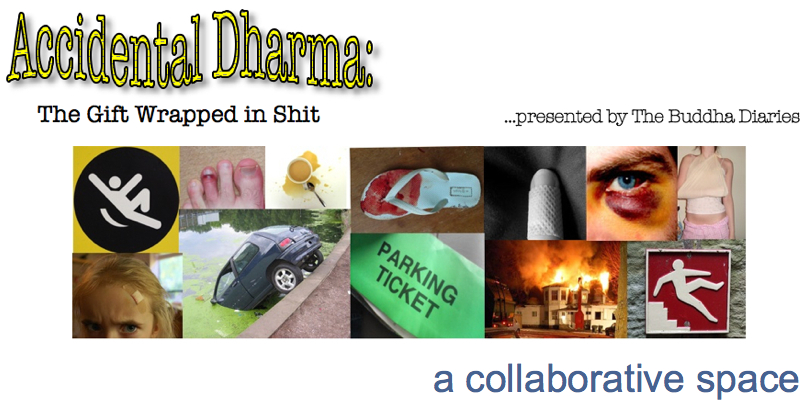“Karma Dharma” might seem to the knitted brow of the avid practitioner, a frivolous jingoism for Devanāgarī, referring to the order which makes the cosmos and the harmonious complexity of the natural world possible. Dharma is simply represented by the eight spoke wheel the Noble Path taught by the Buddha. Karma is what we ‘do.’
1. Right Understanding (or Right View, or Right Perspective) - samma ditthi
2. Right Thought (or Right Intention, or Right Resolve) - samma sankappa
3. Right Speech - samma vaca
4. Right Action - samma kammanta
5. Right Livelihood - samma ajiva
6. Right Effort (or Right Endeavour) - samma vayama
7. Right Mindfulness - samma sati
8. Right Concentration - samma samadhi
http://www.sanghatoday.org/noble-eightfold-path.html
Thus, most of us, Westerners and Easterners alike, begin with complexity of thoughts, the intricacies of semantics, words, new words, old words, our words. With a little luck samma ditthi transforms the holograph of our conditioned reality and the shocking appearance of truth blooms like the first perception of a Mandelbrot.
We begin practice with noise and then grow silent as the tiny mind begins to realize the joke on itself and can’t help but laugh at itself in the depths of its infinite capacity for delusion, its attachment to its self, and continually the realization of the utmost seriousness and absurdity of the wheel itself. ITSELF LOL
Karma Dharma might best be seen as karma yoga for those of us who practice in the maelstrom of a furious, materialistic, spectacle of American culture. And so, we are ever mindful of the joys, great or small, celebratory or grieving, that present us with ‘Accidental Dharma’ by which we practice in the world of illusion and create blessings of compassion in the world.
In this way we all become Bodhisattvas, tethered to human life by choice and do the dog work of Buddha. Buddhism is a complicated menu of living, but it seems to this slow learner that unless one grows silent or laughs loudly, the dream continues into nightmare. Better we dream lucidly. Some of us must think of the Sixth Patriarch when dusting our houses, or Jittoku laughing at the reflection of the moon in a still pond.
The wonderful opportunity of Accidental Dharma lies in all degrees of practice and is usually responsive rather than intellectual. This old monk thinks of my best friend Brother Bob, who died over ten years ago, with a great heave and sigh. Bob suffered terribly in the few years before his death. His illness encapsulated the suffering of the world. A deeply spiritual man and ex Franciscan he reached a point where sheer pain brought with every reflex and move the desire for death, for an end.
One day a neighbor called me in emergency saying that Bob had disappeared from his apartment and was lost. A building super eventually found him, standing confused before a storage closet. He thought it led to the rooftop garden. It happened again several days later.
I sat down with Bob and we had a long talk about how unbearable his life had become and he said that he just wanted to jump off the roof, would I help him? I said of course I would. I would meet him the next day and we would go together, but he had to promise to go with me and not alone.
On the appointed day I met Bob and we began the long, slow walk down the hall to the stair exit. He never questioned why we didn’t use the elevator. And so it went---fifteen to twenty minutes to negotiate the hall and another twenty minutes to execute the three story climb to the rooftop. When we arrived Bob found that the exit was locked. I said, oh well we’ll try again tomorrow and go a different route. We did, the other roof top exit was locked.
And so it went for a few more times, even returning to the first attempt and it was of course a ‘no go‘. After the last try, Bob said, “I think it’s a bad idea.” I said, “but we tried.” I tucked him back in bed and around three in the morning, he sat up in bed, looked me in the eyes, heaved his deep sigh and died.
Saturday, December 15, 2007
Subscribe to:
Post Comments (Atom)


1 comment:
This is a beautiful story, MandT--so filled with love and sadness, and such wisdom in the way you handled Bob's painful search for death. It's quite a parable. Thanks for sharing it.
Post a Comment